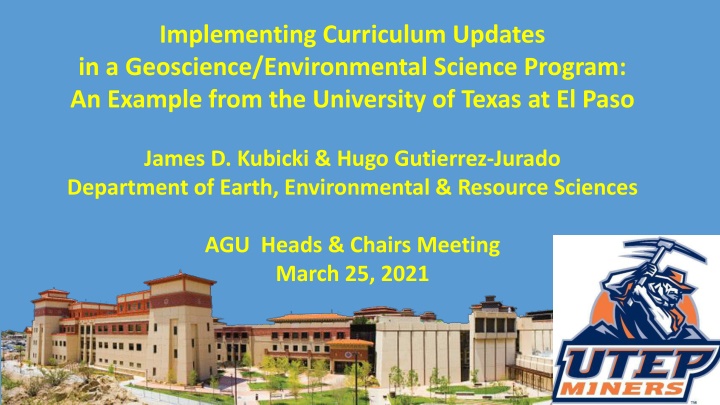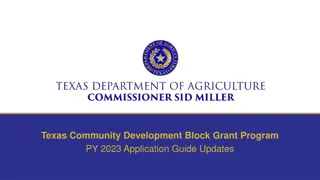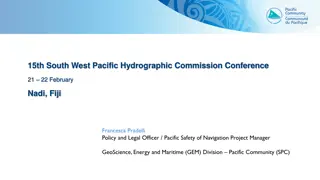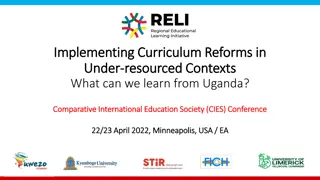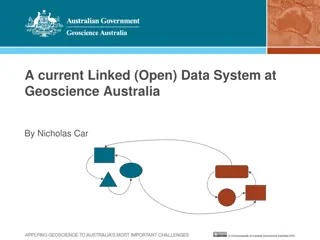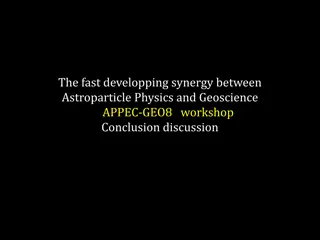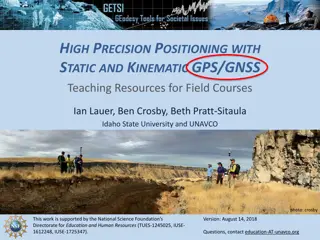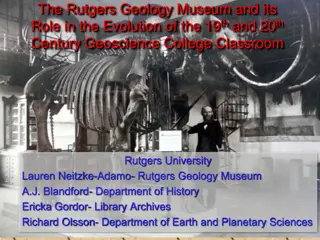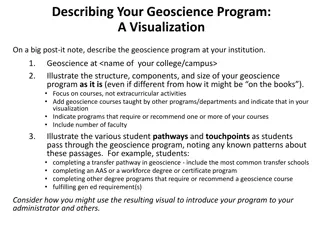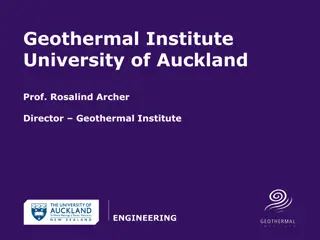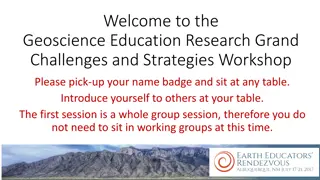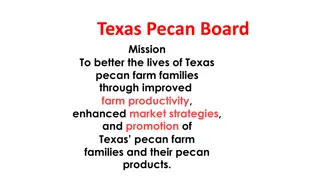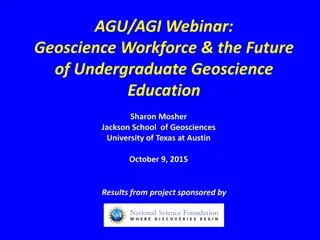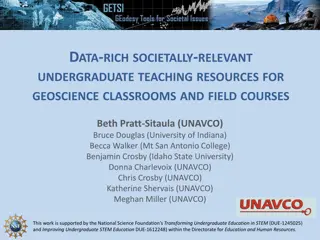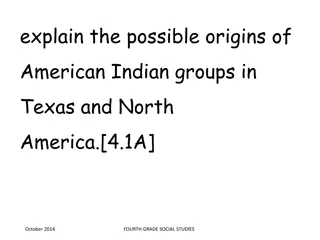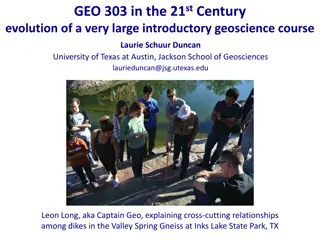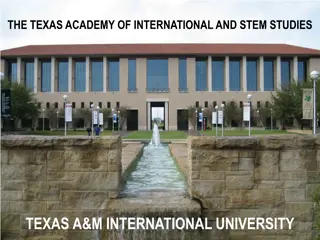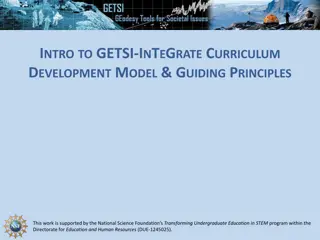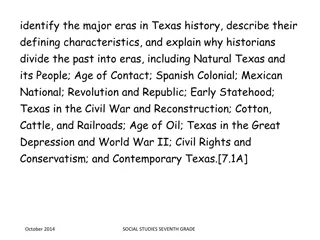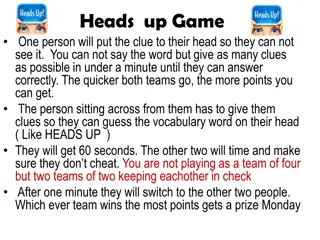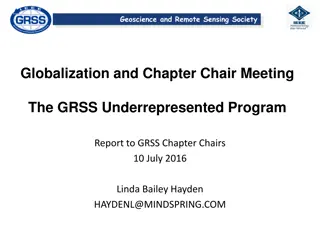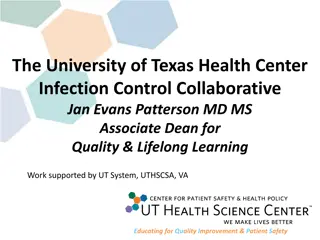Implementing Curriculum Updates in Geoscience Program at University of Texas
This example from the University of Texas at El Paso showcases a successful implementation of curriculum updates in a Geoscience/Environmental Science program. The university emphasized educating students about current career opportunities, equipping them with necessary skills, fostering networking opportunities, and ensuring graduates are adaptable to evolving markets. Through faculty retreats and hands-on field experiences, the program aimed to enhance student readiness for the workforce.
Download Presentation

Please find below an Image/Link to download the presentation.
The content on the website is provided AS IS for your information and personal use only. It may not be sold, licensed, or shared on other websites without obtaining consent from the author.If you encounter any issues during the download, it is possible that the publisher has removed the file from their server.
You are allowed to download the files provided on this website for personal or commercial use, subject to the condition that they are used lawfully. All files are the property of their respective owners.
The content on the website is provided AS IS for your information and personal use only. It may not be sold, licensed, or shared on other websites without obtaining consent from the author.
E N D
Presentation Transcript
Implementing Curriculum Updates in a Geoscience/Environmental Science Program: An Example from the University of Texas at El Paso James D. Kubicki & Hugo Gutierrez-Jurado Department of Earth, Environmental & Resource Sciences AGU Heads & Chairs Meeting March 25, 2021
Serving Society - Educating Students Are we educating students about today s career opportunities? Are we giving students the skills they need to obtain a position & thrive in it? Have students networked sufficiently to feel confident entering the job market? Are graduating students versatile enough to adapt to evolving markets?
National surveys provided data to convince any skeptics that change is needed.
Faculty retreat to determine what we were already doing, identify gaps, and make curriculum more cohesive.
Educating Students - Preparing for a career The world is changing and future scientists must be well prepared to work with a broad range of scales, cross- disciplinary problems, and diverse settings. What skills and knowledge do we want students to obtain before graduation? Observation & Data Collection Data Analysis Quantitative Computer Literacy Broad Fundamentals & In-depth Specialization Critical & Integrative Thinking Research Design
Provide students with resume templates at the earliest possible stages to guide them through skills development as well as degree program. Full-time undergraduate advisor meets with each student every semester with career mentoring provided by faculty.
By pairing and block scheduling our sophomore, junior and senior classes, we take students in the field on a regular basis. This field-oriented, experiential curriculum is rare for a commuter school and allows students to complete our major in 3 years, making possible timely completion by transfer students. We integrate experiences and problem-solving into courses, preparing students for careers in science. Start with team-based research projects in Introduction to Physical Geology labs for majors. Research Opportunities for Community College Students (ROCCS) - Diane Doser and Rob Rohrbaugh (EPCC)
I study water, its storage, circulation and distribution in natural and urban systems. I also help understanding and predicting natural hazards like flooding, landslides and droughts through observations and modeling. Created faculty profile slides to incorporate into courses. Satellite, ground radars and drone- based remote sensing Dr. Hernan Moreno Latino born in Colombia. First scientist and Ph.D. in my family. Piano player (Salsa, Cumbia, Merengue, etc). My former students work in geology and engineering companies and academia. Geographic Information System-based models
We help our students find internships and start careers with companies and government agencies around the country. Example: Angela Trejo I was accepted to participate in the Woods Hole Partnership in Education Program (PEP) as a 2019 summer intern. I worked at the Marine Biological Laboratory in Woods Hole, MA, and gained experience in environmental research. One of the opportunities offered is the PEP research cruise. We boarded a research vessel, called the SSV Corwith Cramer, for five days to experience what it is like to be part of the crew. It was extremely hard, rewarding work!
1) How much progress have you made with your plan? If you modified your plan, in what way did it change and why? We have had a retreat to discuss undergraduate and graduate curriculum revision. Faculty generally agreed on the overall goals, concepts and skills we need to emphasize throughout our curriculum. We did not need to add courses, but we agreed to make courses more consistently emphasize important concepts and skills as a student progresses. 2) What has been accomplished, whether it was in your original plan or not? We have a more cohesive curriculum that stresses repeated exposure and expected mastery of key skills necessary for conducting research, reporting research (oral and written), analyzing data and designing research plans. 3) What are your future plans? We are currently revising the way we do assessments to reflect the new curriculum & goals. 4) Which implementation strategies worked i.e. what was successful, and what wasn t? Pairing courses throughout the undergraduate trajectory is effective because students see the connections between courses and can spend more time as teams working on projects.
5) What were roadblocks to progress or where did problems occur? If you were able to overcome them, what did you do? We are limited in the math and computer skills of many of our undergraduates, so introducing math and computation is difficult. We are working to include examples in every class to show how math and computational skills are important and applied in Geological Sciences. 6) What did you anticipate would be a problem that was not? We started a team-based research laboratory for majors in Physical Geology, but recruiting students into this course consistently has been a problem. 7) Any advice to others who wish to make similar changes? Utilize and undergraduate advisor to let students know what the overall goals of the obtaining a degree in Geological Sciences are. They need to see the big picture. Also, career advising and access to internships are key to opening up students horizons.
Assessment of Geology B.S. program at UTEP Assessment of Geology B.S. program at UTEP Data collection through Field Camp I and II Learning outcomes: 1. A general knowledge of physical and historical geology and of the interrelations between surface and interior earth processes. (Knowledge) 2. The ability to solve geological problems, to propose multiple working hypotheses, to observe, and map surface geology, and deduce subsurface structure. (Knowledge and Skills) 3. The ability to communicate geologic information in oral or written form. (Skill) 4. The professional attitude required to conduct geological investigations as a graduate student or employees in industry or government. (Attitude)
Thank you! Thank you! www.flickr.com/photos/rchiarello/8398790824
